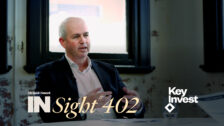Will business and consumer confidence converge?
Global consumer and business confidence have diverged, a trend that started in 2018. It is otherwise pretty rare, only occurring two other times over the last 30-plus years.
These two sentiment factors previously diverged in the periods after the East Asian and European sovereign debt but as the chart below shows, these divergences in sentiment don’t last.
While the global economy hasn’t recently experienced a huge shock to the system like it did in 1998 or 2010, the slowdown in Chinese economic growth has weighed on business confidence.
We have seen other related measures such as capital expenditures, purchasing manager indices (PMIs), inventories, and export orders all weaken as well. So what’s driving this dichotomy between businesses and consumers?
Globally, consumers still have reasons to remain optimistic: unemployment rates are low while wages are up. Retail sales have remained buoyant, a signal we think confirms this positive sentiment. Interestingly, small business confidence also remains high in the US, which means domestic conditions are more buoyant relative to global economic activity and global trade flows.
It’s therefore the management teams of multinational companies that are pessimistic. US CEO surveys also reflect this development. The virtuous cycle created by consumers has been pitted against a vicious one resulting from negative business sentiment. Which one will win out?
We will be watching domestic demand-driven economies closely to see whether these positive domestic factors put upward pressure on business confidence.
Any positive news on the US-China trade negotiations should also perhaps change business sentiment—which doesn’t appear likely over the near term. Regardless, we don’t think this divergence will be sustainable in the long run.
However, one of them will reach an inflection point in the intermediate term.
This divergence has not gone unnoticed by central banks and has continued to confound monetary authorities. Aside from persistently low inflation, global central banks will be tasked with addressing these conflicting sentiment factors over the course of the next year. Can central banks be nimble enough to react to the upcoming convergence in sentiment? Time will tell.
Jack P McIntyre is a portfolio manager at Branywine Global, a Legg Mason affiliate.
Global consumer and business confidence have diverged, a trend that started in 2018. It is otherwise pretty rare, only occurring two other times over the last 30-plus years.










